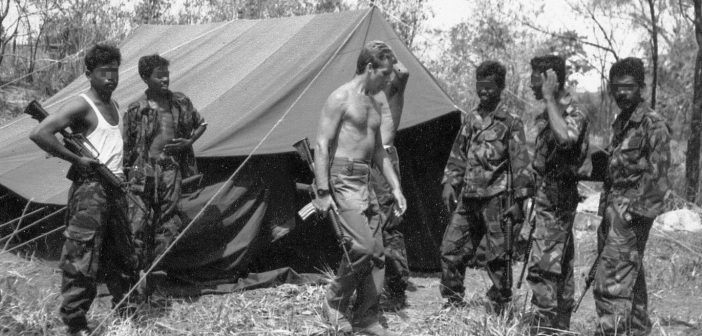Mike Phipps reviews Keenie Meenie: The British Mercenaries Who Got Away with War Crimes, by Phil Miller, published by Pluto Press
This is a shocking book. It opens with an account of a massacre in 1985 in northern Sri Lanka. The Sri Lankan army’s dirty war against the Tamil population was in full swing. In the incident described, helicopters landed and government troops burned down houses and killed civilians. One of the pilots who watched the scene was a tall white man. Three decades later, declassified documents suggest he was a mercenary working for a British company, Keenie Meenie Services – KMS.
Such companies began to multiply in the era of decolonisation in the decades after World War Two. They took on the work that British state forces could no longer undertake worldwide and became the breeding ground for Britain’s vast private security industry. KMS was one of these companies, small at first, but using its connections inside the Foreign Office and other parts of the state administration to great effect.
Some of the new mercenary outfits that sprang up were brutal even by the military standards of the time. There was a public outcry when the commander of one of these ordered the massacre of 14 men under his command who wanted to quit an operation in Angola. The then Labour prime minister set up an enquiry, but the attitude of many government officials was pragmatic and supportive about the deployment of mercenaries. Many were keen to distinguish between the cowboys and the more respectable outfits like KMS, which did a large amount of ‘security work’ in the Middle East and elsewhere for the Foreign Office.
It was a considerable step up from guarding British embassies to providing direct military training in countries like Sri Lanka, where the UK authorities did not wish to appear involved. Recently declassified documents suggest the UK government was not entirely happy about KMS training elite Sri Lankan military units, because they frequently went on the rampage, but initially did nothing to stop it happening.
KMS trained Sri Lanka’s Special Task Force from 1984 on. At this time, the Task Force’s activities attracted fear and loathing across Tamil areas, due to its large number of disappearances of young Tamil men, its widespread use of torture, of collective punishments, rape, looting and summary execution of children. These atrocities were committed on a systematic basis by the Task Force, trained by KMS, who were seemingly implicated in war crimes. Furthermore, local embassy personnel observed: “KMS have been drawn yet further into direct control of and participation in operations.” Yet the logic of privatisation meant that no British government personnel took any responsibility for what was happening.
By 1986, the Sri Lankan government admitted using air strikes on built-up areas. The impact of these was indiscriminate. “By now,” notes Miller, “Whitehall went as far as accepting internally that it was ‘probable’ KMS pilots had ‘taken charge’ of helicopter attacks.” Yet rather than suspend the passports of KMS members, which would have severely curtailed their ability to function, the government soft-pedalled. KMS operatives later confirmed that they had flown combat missions in which civilians were targeted on a large scale. In Miller’s assessment, their role was indispensable: without it, “it is highly likely the Sri Lankan army would have had to abandon the north, effectively giving the Tamils a de facto state of their own.”
There is further evidence if British complicity in these crimes. Despite a ‘fact-finding’ mission to Sri Lanka by the then Home Secretary, the UK government believed it was safe to send back Tamil refugees applying for asylum here.
KMS personnel were also involved in the covert US-led plans to destabilise the democratically elected government of Nicaragua, allegedly detonating bombs in the capital in 1985. This became public in the Congressional investigation into the Iran-contra affair in 1987, where the US had unlawfully financed the contra war against Nicaragua from funds raised by illegally selling arms to Iran. After this exposure, KS rebranded itself under a new name and began working in the Horn of Africa and Afghanistan.
Miller, formerly a researcher at Corporate Watch, has done a meticulous job in piecing together this story, scouring government files at the National Archives, once they were released to the public after a thirty year time lag – even then, heavily redacted. He also tracked down and interviewed some of the participants who had harrowing stories to tell: one spoke of the indiscriminate slaughter of Tamil civilians and compared what was going on in Sri Lanka to the Holocaust.
The main events covered here happened over thirty years ago. But the UK’s private military security business remains in robust health. New Labour squandered an opportunity to regulate it in 2002, when the then Foreign Secretary David Miliband proposed that mercenaries should merely sign up to a voluntary code of conduct. Then came the Iraq war where the industry boomed. Today it is worth up to £275 billion a year and the UK government itself is a significant client.
first published on Labour Hub

